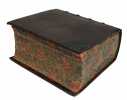- Home page
- Search by criteria
- author : sledanum oswaldum oswald schlee rhegius urbanus spalchaver daniel binchius johannes schroder joachim
1 books for « sledanum oswaldum os... »Edit
"SLEDANUM, OSWALDUM (OSWALD SCHLEE) (+) RHEGIUS URBANUS (+) SPALCHAVER, DANIEL (+) BINCHIUS, JOHANNES (+) SCHRÖDER, JOACHIM
Reference : 61313
(1642)
Dess H Simeonis Lob: und Schwanen Gesang Nunc Dimittis, &c. (+) Dialogus Von der herrlichen trostreichen Predigt, die Christus Luce XXIIII. von Jerusalem bis gen Emaus, den zweien Jungern am Ostertage, aus Mose vnd allen Propheten gethan hat (+) Serm... - [OSWALD SCHLEE'S LAST WORK]
Hamburg, Froben, 1613 (+) Wittemberg, Hans Lufft, 1573 (+) Rostock, Meder, 1640 (+) Lubeck, Meyer, 1642 (+) Rostock, 1642. 4to. In contemporary full calf with four raised bands and richly gilt spine. Leather on spine cracked, with minor loss of the gilt ornamentation. Small paper-label pasted on to top of spine. Front free end-paper with a list of content in contemporary hand. First leaves of ""Dialogus Von der herrlichen"" soiled and first five leaves with repair in lower outer corner, not affecting text. ""Dialogus Von der herrlichen..."" is affected by dampstains throughout, otherwise a nice copy. (4), 455, (25) pp" (4), 310, (4) ff. 192 pp. (16), 112 pp. 11 pp. (4), (24) pp,
An attractive sammelband containing various works all relating to Lutheran theology. Of special interest is Oswald Schlee’s commentary on Simeon’s Nunc dimittis or Song of Simeon from the Gospel of Luke, verses 29 through 32, printed in Rostock in 1613. It is of the utmost scarcity and we have not been able to trace a single work at auction and OCLC list no copies. Only mentioning of the work we have been able to trace is in Willer's ‘Catalogus Novus nundinarum Autumnalium', the Frankfurt Book Fair catalogue from 1613 (itself a great rarity). Oswald Schlee died on January 4th, 1613 so the present work was most likely his last and published posthumously. Schlee's ouevre is centered on “Trostschriften” (consolatory writings) and “Leichpredigten” (funeral sermons) dealing with themes of death, mourning, and Christian consolation. This present work, a biblical canticle expressing a devout man’s readiness for death after seeing the Messiah, is a fine concluding and representative work of Schlee's authorship. Oswald Schlee (1553 - 1613) was a German Lutheran clergyman and theologian. He began his studies at the University of Rostock in 1568 and around 1572 at the University of Jena under Justus Lipsius. In 1579, he earned his Master of Philosophy degree in Rostock. From 1577 to 1589, he was a deacon at the St. Peter's Church in Rostock. From 1589, he served at the St. Mary’s Church in Rostock, becoming Archdeacon until 1609, and from 1609 to 1613 he was the pastor and starting in 1610, also the city superintendent.
 Write to the booksellers
Write to the booksellers




